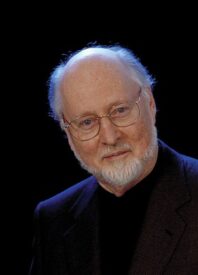
If I say Indiana Jones, there are a few names that are completely entwined with that name. And they will step unbidden into the mind’s eye at the mention of his name. Out of the shadows will step that iconic fedora-wearing, bullwhip-wielding silhouette that becomes Harrison Ford. Behind him, both bearded, are his creators, George Lucas and Steven Spielberg.
And did you hear that? As soon as you saw that backlit, iconic silhouette you heard the brass section of an orchestra deliver the familiar notes to a theme. One that has found a home in the hearts of millions and made itself comfortable in the collective consciousness.
Composer John Williams has a long history not only with George Lucas and Steven Spielberg (scoring almost all of Spielberg’s films, with notable exceptions) but with theatrical scores. He delivered indelible themes that can’t help but spring to mind when you think of its corresponding film. Superman: The Movie, Star Wars, Jaws, Home Alone, Harry Potter and The Philosopher’s Stone. And that isn’t even the tip of the iceberg.
Cinephiles and music buffs could argue forever over Williams’ most important and iconic work. And each would be right in their opinion. But there is definitely an argument we can make for his score for the 1981 film, Raiders of the Lost Ark. The same goes for the four sequels that have come after it. Temple of Doom, The Last Crusade, Kingdom of the Crystal Skull. And now The Dial of Destiny.
His score for Raiders embraces and romanticizes the serial adventures (dig into Desert Chase) to which the film paid homage. It also layers in in mystery and wonder throughout it. If you doubt me, throw on the track entitled ‘The Map Room: Dawn’. It’s arguably one of my favourite music cues of all time, there’s discovery, tension, and more in the chords Williams has his orchestra deliver.
But of course, The Raiders March is the most celebrated piece of music from the franchise. And through every iteration Williams has kept it fresh, subtly changing it, incorporating other themes, and juxtaposing notes, and it engages your excitement every time it plays. I challenge anyone who hears it to not imagine going on some globetrotting adventure.
As much as I love the scores for all the Indy films, everything you need to know about the character, and the composer are all in that first soundtrack, which was first released in June of 1981 by Columbia Records.
The entire album plays like a highlight reel for the film. There’s the moody opening titles in Peru, the mystery and horror of the ‘Well of Souls,’ the wonder of the ‘Map Room’. There’s the action beats of ‘The Desert Chase’. Also, there’s the romance of ‘Marion’s Theme,’ the confusion and worry of ‘The Basket Game’. And all of it is wrapped up neatly with the recurring motif of ‘The Raiders March’.
The score was nominated for an Academy Award, losing out to Vangelis’ score for Chariots of Fire. I can honestly say that’s a tragedy, as memorable as some of the pieces from that soundtrack were do they have the staying power of Raiders? Not a chance.
In fact, Williams’ reliability and exceptional skill as a composer is one of the big draws of these films. Because no matter what your opinion of the franchise is, they all come with a couple of things that will make the film enjoyable, Harrison Ford, and music by John Williams.
Cue that theme!
- Rated: G, PG, U
- Genre: Action, Adventure, Epic, Family, Fantasy, Horror
- Directed by: Chris Columbus, George Lucas, Steven Spielberg
- Starring: Daniel Radcliffe, Harrison Ford, Kate Capshaw, Macaulay Culkin, Mark Hamill, Roy Scheider, Sean Connery
- Produced by: David Brown, Frank Marshall, Gary Kurtz, John Hughes, Robert Watts, Russell Lodge
- Written by: John Williams
- Studio: 20th Century Fox, Heyday Films, Lucasfilm Ltd., Paramount, Universal Pictures

